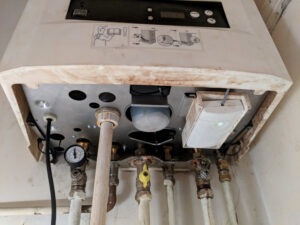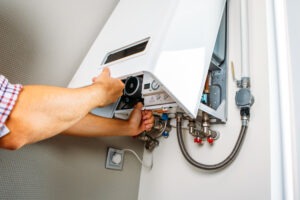- Home
- About Us
- Member Profiles
- Help and Advice
arrow_drop_down
- Conciliation
arrow_drop_down
- Guild magazine
Gas installation and safety
 Has your creaky old boiler finally given up the ghost? Or are you considering fitting out an entire period property with an updated gas heating system? Perhaps you’ve just finished a new build and it has yet to be hooked up to the national grid? Whatever the scale of the job, where gas is concerned, you can’t cut corners. The most important thing to know is that you must hire an engineer who is on the Gas Safe Register.
Has your creaky old boiler finally given up the ghost? Or are you considering fitting out an entire period property with an updated gas heating system? Perhaps you’ve just finished a new build and it has yet to be hooked up to the national grid? Whatever the scale of the job, where gas is concerned, you can’t cut corners. The most important thing to know is that you must hire an engineer who is on the Gas Safe Register.
Statistics from the Gas Safe Register show that around 20% of illegal gas work it has investigated is found to be immediately dangerous. And in the UK every year, some 250,000 gas jobs are illegally performed by unregistered ‘engineers’. This serious threat to the health and safety of both homeowners and the general public means that the Health and Safety Executive (HSE) cracks down hard on any gas work undertaken by unqualified individuals. Penalties range from suspended sentences to hefty fines and community service.
So, it’s advisable to spend some time researching and understanding the legislation around gas ‘work’. There are strict safety laws in place in the UK, Northern Ireland, Isle of Man and Guernsey that cover ‘work in relation to gas fitting’. The main examples are listed here:
- installing or reconnecting the fitting
- maintaining, servicing, permanently adjusting, disconnecting, repairing, altering or renewing the fitting or purging it of air or gas
- where the fitting is not readily movable, changing its position
- removing the fitting
 But do bear in mind that this is not an exhaustive list – head to the specific government website to check fully. You should also be aware that it is a breach of the law to undertake such work yourself and have a Gas Safe Registered engineer simply ‘approve’ it. And although it’s highly unlikely that planning permission will be required for any gas installation work, if you live in a designated area or listed building, do check with your local council before proceeding.
But do bear in mind that this is not an exhaustive list – head to the specific government website to check fully. You should also be aware that it is a breach of the law to undertake such work yourself and have a Gas Safe Registered engineer simply ‘approve’ it. And although it’s highly unlikely that planning permission will be required for any gas installation work, if you live in a designated area or listed building, do check with your local council before proceeding.
Finding the right Gas Safe engineer
If you don’t want to spend hours Googling ‘gas engineer near me’, hiring professional, skilled and Gas Safe register approved tradespeople is easy at Find a Craftsman. One quick click here gives you access to every kind of trade professional, including gas installers, boiler and heating specialists, all accredited experts with The Guild of Master Craftsmen. In this blog, we’ll go into more detail about the Gas Safe register and explore the costs and considerations for gas installation.
What is a Gas Safe registered engineer qualified to do?
As we’ve already established, anyone carrying out gas work is legally required to be listed on the Gas Safe Register. All Gas Safe registered engineers will be able to produce a Gas Safe ID (issued annually) – proof that he/she has certain ‘core’ qualifications that means they are working safely and legally. Further categories they legally specialise in are listed on the back of the card. (See below).
How to run a gas safe register check
For added peace of mind, you can double check the engineer’s unique 7-digit licence number or a business’s registration number (between 1–6 digits) at gassafe.register.co.uk. Here you will also be able to take a closer look at the specific categories – domestic or commercial (examples below) – and find what they are qualified in. The most common type of gas work broadly covers:
- install – permanently fixing, locating and connecting an appliance to a gas supply to meet gas regulations.
- commission – operational checks to ensure the correct and gas safe operation of the newly installed gas appliance.
- service – the upkeep of a gas appliance to enable safety and efficiency.
- safety check – comparable to a car MOT, this is a series of basic safety function and condition checks.
Domestic categories | Commercial categories |
Cookers Boilers Water heaters Range cookers Tumble dryers Pipework Gas fires Gas meters | Wet central heating (gas-fired commercial boilers) Heat pumps/air heating Commercial laundry/catering appliances Swimming pool boilers Incinerators |
Quick checker: gas installation cost guide
Now you have ticked the important Gas Safe Registered engineer box, it’s helpful to have a rough ballpark for costs. The table below is a good starting point, and we go into more detail about specific projects further down.
Description | Average cost |
Gas engineer (per hour) | £30–£40 |
Install and fit new gas connection to mains supply | £1,500 |
Install a gas cooker | £75–£100 |
Install a gas fire | £150–£300 (plus annual servicing £60– £100) |
Cap a gas pipe | £500 |
Combi boiler and heating system (most popular), excluding labour | £2,360–£4,460 (for eight radiators) |
 Cost for connecting to mains supply
Cost for connecting to mains supply
For new build homes or those that are not yet ‘on grid’, the price will be affected primarily by the property’s distance from the national gas grid. Basically, the further away, the more you pay. Other obstacles that could push up costs include roads, surrounding properties and private land. So, it’s wise to consider these factors well ahead of time to avoid a nasty financial shock. Budget roughly £15–£20 per metre of pipe.
Cost for capping a gas pipe
If you are concerned there is a potentially dangerous gas leak or you no longer need a gas supply – for example, a business may want a meter removed to eliminate standing charges – an engineer will need to ‘cap off’ the pipe. This involves simply screwing a cap onto the end of the pipe, but it must be done by a Gas Safe Registered engineer. Ease of access to the gas pipe and the complexity of the job can affect the cost quoted above.
Cost for installing gas central heating
There are many factors to consider if you’re considering changing your heating system, whether it’s to replace old electric storage heating or your boiler has finally given up the ghost. You’re looking at typical costs of between £2,000–£5,000, depending on the type of system and its size (how many radiators will be installed). The table below looks at the three main types of gas central system set-ups, along with their pros and cons.
Description | Pros | Cons |
Combination | • Instantaneous hot water • Compact • Easy to install • High efficiency rating, lower energy bills | • Mains fed: more than 2 bathrooms can cause ‘draw off’ as the demand on the mains-fed water supply increases |
Conventional | • Good choice for older homes in areas with low water pressure • Solar thermal system compatible – helps to cut down on carbon emissions and energy bills | • Requires space for both a hot water storage cylinder and a tank • Water may take a while to heat up • Installation can take longer, pushing up initial cost |
System boiler (e.g. Megaflow) | • Cylinders can be stored in garages or attics • Hot water on tap • Affordable running costs • Compatible with solar thermal systems | • Requires a mains water flow rate of 22l per minute, not suitable for low-pressure water areas • May need extra insulation to stop energy and heat loss |
Hopefully you will now have a much better idea about gas installation and the safety aspects required by law. As the UK’s most established trade association, The Guild of Master Craftsmen has been proudly representing tradespeople and artisans who have skill, integrity and expertise for over 40 years. So if you’re feeling inspired to crack on with the next steps, why not head over to Find a Craftsman to find the right Gas Safe Registered engineer in your area?

